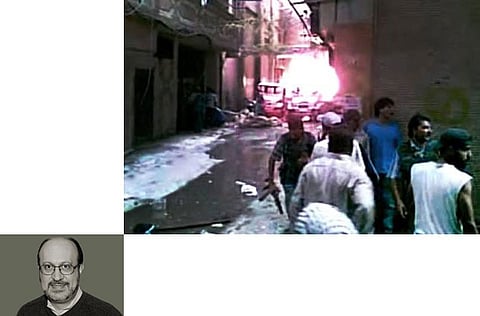UN Security Council shackled by vetoes
Permanent members have transformed the body into a hopelessly deadlocked institution

When the League of Nations came about at the end of the First World War, the major powers of the day wished to create a global system to protect intrinsic interests and, if possible, prevent further calamities. In turn, the UN succeeded a crippled League following the Second World War, equipped with a veto-yielding Security Council to beat ‘swords into ploughshares’.
Sadly, the 20th century was probably the bloodiest in the history of mankind, with at least 160 million people killed in various wars. At the beginning of an increasingly multi-polar 21st century, world powers are anxiously putting several nails in the Security Council’s coffin, with dire consequences for all.
Can the world settle on a new arrangement without engaging in a third World War?
This question is not theoretical and must be raised seriously for it seems that discarded Cold War rhetoric is re-emerging with Russia and China determined to withstand the western juggernaut that has swept the second half of the last century. The fact that Russia and China cast three recent vetoes to prevent a putative intervention in Syria under Chapter Seven reminded the entire world what was truly wrong with the premier security institution; a mechanism that favoured state interests rather than human lives.
In fact, and while the Soviet Union cast nearly half of all the vetoes in the history of the Security Council (127 out of a total of 264 to date), Moscow’s record was tallied before 1965 at the height of the Cold War. Between 1946 and 2010, the US used its veto prerogative on 82 separate occasions, regrettably more than any other permanent member after 1972 — with the bulk to protect Israel — while Britain, France, and China, in that order, cast 32, 18 and 9 vetoes.
The most recent rejections, hence, stood out as clear illustrations that the permanent members preferred to disagree.
In the event, the last three refusals essentially buried Kofi Annan’s peace plan, as the UN-Arab League envoy failed to secure a ceasefire in Syria. President Bashar Al Assad and the Syrian opposition led by the Free Syrian Army will now fight it out to the death while the international community watches, comments, deplores, and fuels the fighting galore.
No agreement
It must be emphasised that the third Russian/Chinese veto last week merely called to “end the use of heavy weapons in Syria”. Amazingly, there was no agreement over what was mostly a technical matter even if the exercise highlighted what prevented the international community from working together to solve problems.
The Russian position was crystal clear: Moscow preferred to lose Syria as an ally rather than cave in to a perceived western diktat or be seen as a power that abandoned the Baath regime in Damascus. Obstinate, the Russians may calculate that they ought to be ready for the day after, perhaps even play a role in any international peacekeeping force that could be deployed to end the bloodshed and start rebuilding Syria’s shattered institutions.
Still, although pragmatic Russian leaders know full well that the Syrian regime has no chance of staying in power, their mixed messages cannot endear Moscow to the powerbrokers that will emerge in Damascus. Ultimately, Moscow must decide two specific points to eliminate the confusion emanating from the Kremlin: first, decide whether it is part of the western community of nations on account of its Slavic signature and, second, whether it prefers to revive the Cold War.
The latter option will mean that Moscow will stand against the vast majority of people anxious to prosper rather than wallow in poverty. Even if the Russian economy was the world’s sixth largest in nominal value — GDP at $2.2 trillion (Dh8 trillion) in 2010 for 145 million inhabitants — it remained fragile.
The UK, in comparison, boasted the world’s seventh largest economy in nominal value — GDP at $2.18 trillion in 2010 for 62 million inhabitants — and was rock solid. Russia, consequently, depended on European countries whose markets were critical to its own survival and, without massive direct foreign investments, hostage to outside developments.
China faced a similar dilemma and may well have to reassess its blatantly anti-western rhetoric given that the Middle Kingdom cannot long function as the world’s factory without access to essential markets. By siding with a near-universally abhorred regime, Beijing’s stand on Syria will surely have repercussions as Arabs will long remember which powers stood with them and which were against them.
Because of the fallout from the 2011 Libya campaign, Russia and China will not allow a UN-backed military operation to be repeated in Syria, as neither country was prepared to concede a single political inch to western powers. Still, Washington and its allies needed to find a new modus operandi to prevent an escalation that could be disastrous for everyone.
All sides ought to reconsider their ongoing dishonest and intransigent performances that have now transformed the Security Council into a hopelessly deadlocked institution. The option of a permanent member pressuring another was gone for good. What were left were economic rivalries, which could literally unleash war or peace, and that will either create prosperity or guarantee fresh hardships for millions around the world.
Dr Joseph A. Kechichian is the author of the forthcoming Legal and Political Reforms in Saudi Arabia (Routledge, 2012).
Sign up for the Daily Briefing
Get the latest news and updates straight to your inbox



